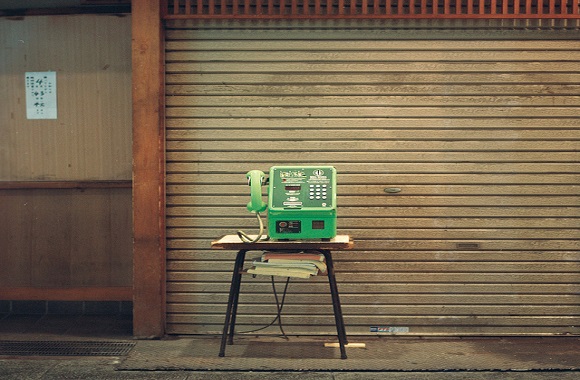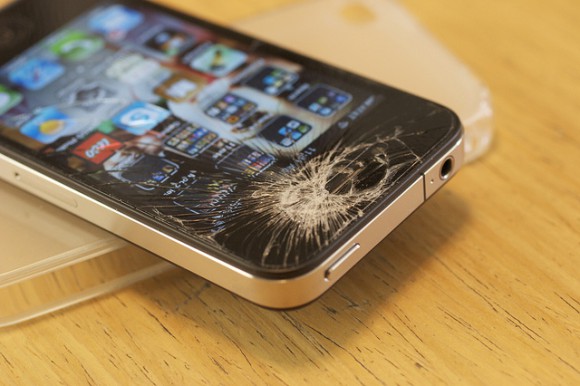
Back when I was working in city hall at a small rural town in Kyoto prefecture, one of my duties involved heading to the fire station a few times a month to “role play” with the firemen. (Hey, it beat pushing papers.) To help them gain some experience with handling potential emergency calls from foreign residents, I would play the part of the panicking gaijin, often trying to come up with weird and wacky scenarios for the emergency services guys to handle. The object was to train the (almost completely non-English speaking) EMTs to pick out essential keywords such as “fire”, “car accident”, “unconscious”, etc from a barrage of English, but mostly I just had a blast inventing crazy scenarios like “my Playstation 3 just blew up and set fire to my neighbour’s poodle!”
It’s not all fun and games, however. Time-wasting calls to Japan’s emergency services numbers 119 and 110 have been a serious problem recently, with increasing numbers of people abusing the service to ask for help with a range of ridiculous scenarios, ranging from running out of toilet paper to forgetting their smartphone password…
As mentioned above, Japan has two dedicated numbers for the emergency services, 119 for fire and ambulance and 110 to contact the police. Niconico News recently reported that in 2014, 24.3% of all calls made to the 110 number were classed as “non-essential”, and that included the following examples:
“One person called to ask for help when they discovered that the public restroom they were in had no toilet paper.”
“One person called to ask for advice, having forgotten their smartphone pass lock and accidentally getting locked out of their phone.”
“Another called to complain when the vending machine they were using short-changed them.”
“One panicked caller wanted urgent help when they accidentally blocked a friend’s toilet.”
“After discovering that an insect had become lodged in their ear, one person called the police for advice on correct removal procedure.”
And in perhaps the most obnoxious example of all, a mother called the police to ask them to send a patrol car to take her unwell child to the doctor, as she didn’t feel like braving the rush-hour traffic herself.
▼ It’s not like we’re entirely unsympathetic to the plight of the person who found themselves in a TP conundrum, but that’s still no excuse to go bothering the fuzz.
Our source also reports that last year, the police recorded an average response time of only seven minutes, a pretty impressive number despite being four seconds slower than the number recorded in 2013. Still, if you multiply those seven minutes by the total number of nonsense calls, that’s an awful lot of wasted police time that could be spent on better things, like arresting people who don’t realise that printing 3-D guns is illegal, or busting pervs with secret cameras hidden in their shoes.
▼ Forgetting your smartphone passcode is certainly frustrating, but calling the police about it just seems like an incredibly dumb idea, since there’s always the chance they’ll think you swiped it from someone else.
If in doubt, it’s always better to call the secondary “advice” line that’s meant for non-emergencies, which in Japan is the easily-memorable #9110. But for truly dumb cases like those listed above, we’d recommend googling it first – after all, there’s bound to be someone else on the internet with the exact same problem as you – even if it’s something as mad as singeing the fur off your neighbour’s poodle with a faulty PS3…
Edit: Thanks to reader Kai for pointing out that the important ‘#’ must be dialled when calling with a non-emergency.
Source: Niconico News, Esuteru.com
Main Image: Owlnwolf@Flickr



 Japanese police to introduce video function to emergency 110 calls
Japanese police to introduce video function to emergency 110 calls Kobe City firefighters ask you to stop calling emergency numbers for trivial stuff like sunburns
Kobe City firefighters ask you to stop calling emergency numbers for trivial stuff like sunburns Spike in empty houses calling the fire department in Akita City baffles authorities
Spike in empty houses calling the fire department in Akita City baffles authorities Sushi chef drops knives on the train, causes panic and delays
Sushi chef drops knives on the train, causes panic and delays Japanese teen calls cops on man she thinks is holding a knife, turns out he just has old tech
Japanese teen calls cops on man she thinks is holding a knife, turns out he just has old tech McDonald’s new Happy Meals offer up cute and practical Sanrio lifestyle goods
McDonald’s new Happy Meals offer up cute and practical Sanrio lifestyle goods All-you-can-drink Starbucks and amazing views part of Tokyo’s new 170 meter-high sky lounge
All-you-can-drink Starbucks and amazing views part of Tokyo’s new 170 meter-high sky lounge Beautiful Sailor Moon manhole cover coasters being given out for free by Tokyo tourist center
Beautiful Sailor Moon manhole cover coasters being given out for free by Tokyo tourist center Studio Ghibli glasses cases let anime characters keep an eye on your spectacles
Studio Ghibli glasses cases let anime characters keep an eye on your spectacles Kyoto’s 100 Demons yokai monster parade returns!
Kyoto’s 100 Demons yokai monster parade returns! Hamster abandoned at Tokyo ramen restaurant gets new home
Hamster abandoned at Tokyo ramen restaurant gets new home Starbucks reopens at Shibuya Scramble Crossing with new look and design concept
Starbucks reopens at Shibuya Scramble Crossing with new look and design concept Super Nintendo World expansion gets delayed for several months at Universal Studios Japan
Super Nintendo World expansion gets delayed for several months at Universal Studios Japan Should you warm up your convenience store onigiri rice balls in the microwave?【Taste test】
Should you warm up your convenience store onigiri rice balls in the microwave?【Taste test】 The greatest sushi roll in Japanese history is actually nine sushi rolls in one【Photos】
The greatest sushi roll in Japanese history is actually nine sushi rolls in one【Photos】 Disney princesses get official manga makeovers for Manga Princess Cafe opening in Tokyo
Disney princesses get official manga makeovers for Manga Princess Cafe opening in Tokyo More foreign tourists than ever before in history visited Japan last month
More foreign tourists than ever before in history visited Japan last month Beautiful new Final Fantasy T-shirt collection on the way from Uniqlo【Photos】
Beautiful new Final Fantasy T-shirt collection on the way from Uniqlo【Photos】 Is the new Shinkansen Train Desk ticket worth it?
Is the new Shinkansen Train Desk ticket worth it? Foreign English teachers in Japan pick their favorite Japanese-language phrases【Survey】
Foreign English teachers in Japan pick their favorite Japanese-language phrases【Survey】 Japanese convenience store packs a whole bento into an onigiri rice ball
Japanese convenience store packs a whole bento into an onigiri rice ball We try out “Chan Ramen”, an underground type of ramen popular in the ramen community
We try out “Chan Ramen”, an underground type of ramen popular in the ramen community Studio Ghibli releases Kiki’s Delivery Service chocolate cake pouches in Japan
Studio Ghibli releases Kiki’s Delivery Service chocolate cake pouches in Japan Japan’s bone-breaking and record-breaking roller coaster is permanently shutting down
Japan’s bone-breaking and record-breaking roller coaster is permanently shutting down New definition of “Japanese whiskey” goes into effect to prevent fakes from fooling overseas buyers
New definition of “Japanese whiskey” goes into effect to prevent fakes from fooling overseas buyers Our Japanese reporter visits Costco in the U.S., finds super American and very Japanese things
Our Japanese reporter visits Costco in the U.S., finds super American and very Japanese things Studio Ghibli unveils Mother’s Day gift set that captures the love in My Neighbour Totoro
Studio Ghibli unveils Mother’s Day gift set that captures the love in My Neighbour Totoro Foreign passenger shoves conductor on one of the last full runs for Japan’s Thunderbird train
Foreign passenger shoves conductor on one of the last full runs for Japan’s Thunderbird train Domino’s Japan now sells…pizza ears?
Domino’s Japan now sells…pizza ears? New Japanese KitKat flavour stars Sanrio characters, including Hello Kitty
New Japanese KitKat flavour stars Sanrio characters, including Hello Kitty Kyoto creates new for-tourist buses to address overtourism with higher prices, faster rides
Kyoto creates new for-tourist buses to address overtourism with higher prices, faster rides Sales of Japan’s most convenient train ticket/shopping payment cards suspended indefinitely
Sales of Japan’s most convenient train ticket/shopping payment cards suspended indefinitely Sold-out Studio Ghibli desktop humidifiers are back so Totoro can help you through the dry season
Sold-out Studio Ghibli desktop humidifiers are back so Totoro can help you through the dry season Japanese government to make first change to romanization spelling rules since the 1950s
Japanese government to make first change to romanization spelling rules since the 1950s Ghibli founders Toshio Suzuki and Hayao Miyazaki contribute to Japanese whisky Totoro label design
Ghibli founders Toshio Suzuki and Hayao Miyazaki contribute to Japanese whisky Totoro label design Doraemon found buried at sea as scene from 1993 anime becomes real life【Photos】
Doraemon found buried at sea as scene from 1993 anime becomes real life【Photos】 Tokyo’s most famous Starbucks is closed
Tokyo’s most famous Starbucks is closed One Piece characters’ nationalities revealed, but fans have mixed opinions
One Piece characters’ nationalities revealed, but fans have mixed opinions We asked a Uniqlo employee what four things we should buy and their suggestions didn’t disappoint
We asked a Uniqlo employee what four things we should buy and their suggestions didn’t disappoint Princesses, fruits, and blacksmiths: Study reveals the 30 most unusual family names in Japan
Princesses, fruits, and blacksmiths: Study reveals the 30 most unusual family names in Japan Japanese woman asks for advice on how to deal with smell of son’s corpse, gets arrested
Japanese woman asks for advice on how to deal with smell of son’s corpse, gets arrested Mystery stink haunts Kanagawa Prefecture, worries seismologist
Mystery stink haunts Kanagawa Prefecture, worries seismologist Bullets on the bullet train as three men found carrying guns on Japan’s Shinkansen
Bullets on the bullet train as three men found carrying guns on Japan’s Shinkansen Anime-style art encourages young women to report Japanese train gropers in new posters
Anime-style art encourages young women to report Japanese train gropers in new posters Osaka man finds stranger eating in his kitchen at night, stranger dies shortly after
Osaka man finds stranger eating in his kitchen at night, stranger dies shortly after Human skull found in Universal Studios Japan bushes
Human skull found in Universal Studios Japan bushes Yamagata police tell residents not to worry about knife-wielding man roaming the streets
Yamagata police tell residents not to worry about knife-wielding man roaming the streets Pony runs through Shibuya after escaping pet shop 【Video】
Pony runs through Shibuya after escaping pet shop 【Video】 Japanese love doll mistaken for drowned corpse, saved by emergency services anyway
Japanese love doll mistaken for drowned corpse, saved by emergency services anyway Almost half of Japanese people hide when their doorbell rings — here’s why
Almost half of Japanese people hide when their doorbell rings — here’s why Anti-stalker Male Voice Clip Collection for Women Who Live Alone released by Japanese band【Video】
Anti-stalker Male Voice Clip Collection for Women Who Live Alone released by Japanese band【Video】 Man arrested for stealing a pack of lactic acid drinks from Osaki City Hall
Man arrested for stealing a pack of lactic acid drinks from Osaki City Hall Why does it take so long for Japanese trains to start running again after an accident?
Why does it take so long for Japanese trains to start running again after an accident? “Japan’s slowest roller coaster” derails, passengers don’t notice
“Japan’s slowest roller coaster” derails, passengers don’t notice Yamanote Line train temporarily suspended after carriage fills with smoke in Tokyo
Yamanote Line train temporarily suspended after carriage fills with smoke in Tokyo Yakuza may be blocked from using all expressways in Japan within the decade
Yakuza may be blocked from using all expressways in Japan within the decade
Leave a Reply